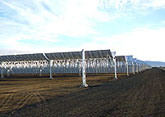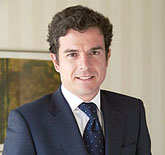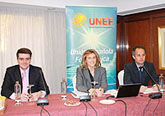The latest decision on the future of Garoña is now on the Government´s roof, after the Plenum of the Nuclear Safety Council, (CSN for its acronym in Spanish) yesterday issued a favorable report, although with many conditions, to renew the nuclear power plant´s authorization to operate, following cessation of electricity production since December 16, 2012.
Cristina Narbona has been the only member of the Plenary who has voted against this decision that has had the approval of the rest: the president, Fernando Martí; vice president, Rosario Velasco, and the other two directors Fernando Castelló and Javier Dies.
In any case, on its expert opinion the CSN sets many conditions to renew the operating authorization requested in 2014 by its holder, Nuclenor, owned by Iberdrola and Endesa each with a 50% stake.
According to what Europa Press has been reported by sources from the Ministry of Energy, Álvaro Nadal wants to take his time to decide and plans to open a dialogue with companies, ecologists and autonomous communities in this regard. In any case, they assert that whatever the decision is it will not entail «any precedent for future decisions on other plants.» Meanwhile, all the opposition parties showed yesterday their disappointment about the CSN decision.
The CSN convened yesterday and as a matter of urgency a press conference to state its decision and the conditions included in its expert report for Garoña reopening. Fernando Martí explained that it is up to the Government to approve its launch and that the same will decide for how long.
The conditions for Garoña reopening
According to a statement issued late in the afternoon by the CSN itself, the first eight conditions, out of a total of ten, refer to generic requirements included in the operating authorizations of all nuclear power plants such as identification of the owner and responsible operator, maximum authorized power, Official Exploitation documents or improvement programs.
However, the two remaining conditions have been fixed around two specific moments of the installation, explains this body: the first fuel charge and the self-sustaining nuclear chain reaction.
Thus, condition number 9 states that: «Before the first nuclear fuel charge in the reactor, the responsible operator must complete the necessary actions to achieve the level of nuclear safety and radiation protection provided for such operational situation, in accordance with Supplementary Technical Instructions issued «. In addition, the start of the operations of the first fuel load will require the CSN’s favorable assessment.
For its part, condition 10 states that: «Before the reactor produces a self-sustaining nuclear chain reaction, ie the number of neutrons produced and absorbed inside the reactor is the same (a situation that Is technically called reactor criticality), the operator must complete the necessary actions to ensure the safe operation of the plant, in accordance with the Supplementary Technical Instructions issued”.
The list of 10 limits and conditions is complemented with fifteen Supplementary Technical Instructions (ITC). The first thirteen are associated with generic aspects of exploitation authorization.
However, the supplementary technical instruction 14 is directly related to condition 9, so that Nuclenor must comply with all its sections before loading nuclear fuel into the reactor.
Gas treatment
Likewise, members of the Plenary have also favorably reported on their assessment of plant design modifications, such as the commissioning of a new Reserve Gas Treatment System (SBGTS).
In the case of the design modification involving the implementation of the gas treatment system and the containment filter venting system, Nuclenor will also be required Minetad’s authorization, following a mandatory and binding report from the CSN, before the fuel load.
Greenpeace: «Nuclenor has not done its part»
From Greenpeace, Raquel Montón, responsible for its Nuclear Campaign, has said that «Garoña cannot refuel or produce electricity, but the CSN dares to give a favorable report, even if there are plenty of reasons not to do so, because Nuclenor has not done its part of the job and because they have been asked for it in Congress. However, they have not hesitated to undermine nuclear safety in Spain and ignore Parliament to favor the interests of the nuclear industry. «
«If the Minister of Energy plays a clean role, he cannot use this report and extend the nuclear plants life through the back door, without democratic participation and using Garoña as a cover. Álvaro Nadal knows that Parliament and all citizens should participate in this debate,» Montón concluded.
A very different vision from the Forum of the Spanish Nuclear Industry. Its president, Antonio Cornadó, thinks that «the continuity of operation of the Spanish nuclear power plant, under the supervision of the CSN, is an appropriate and necessary energy strategy for our country in the current context of economic recovery and in the transition towards a sustainable model, not only from the energy point of view but also economic and environmental, «the organization said in a statement.
In this line, they recall that there are other countries around us that are betting on the continuity of operation of their nuclear plants and that there are now more than 100 reactors authorized for this in the world. «Ten years of additional operation of Spanish nuclear power plants means generating the electricity equivalent to two and a half years of annual national consumption, avoiding the emission of more than 400 million tons of CO2 and consolidating 27,500 highly qualified and stable jobs over time «Antonio Cornadó stated.
Carlos Sánchez Criado
Publicista por la Universidad Complutense. Director comercial de publicaciones técnicas del sector de la energía durante doce años. Director de Energy News Events, S.L. desde 2012 difundiendo información en Energynews.es, movilidadelectrica.com e hidrogeno-verde.es. Y por supuesto, organizando eventos como VEM, la Feria del Vehículo Eléctrico de Madrid.


























